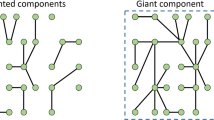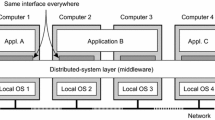Abstract
This paper proposes a framework to translate certain subclasses of differential equation systems into practical protocols for distributed systems. The generated protocols are intended for large-scale distributed systems that contain several hundreds to thousands of processes. The synthesized protocols are state machines containing probabilistic transitions and actions, and they are proved to show equivalent stochastic behavior to the original equations. The protocols are probabilistically scalable and reliable, and have practical applications in large-scale distributed systems, e.g., peer to peer systems. In order to illustrate the usefulness of the framework, it is used to generate new solutions for the problems of (a) responsibility migration (giving rise to a novel model of dynamic replication), and (b) majority selection. We present mathematical analysis of these two protocols, and experimental results from our implementations. These two protocols are derived from natural analogies that are represented as differential equations—endemics and the Lotka–Volterra model of competition, respectively. We believe the design framework could be effectively used in transforming, in a very systematic manner, well-known natural phenomena into protocols for distributed systems.
Similar content being viewed by others
References
Achlioptas D. (2001). Lower bounds for random 3-SAT via differential equations. Theor. Comp. Sci. 265(1–2): 159–185
Ambrosio, J.: Tools for the code generation. ADTmag.com, http://www.adtmag.com/article.asp?id=7850 (2004)
Anderson, R.J.: The Eternity Service. In: Proc. Pragocrypt (1996)
Bailey N.T.J. (1975). Epidemic theory of infectious diseases and its applications, 2nd edn . Hafner, New York
Bhagwan, R., Savage, S., Voelker, G.M.: Understanding availability. Proc. Int. Symp. Peer Peer Syst. 135–140 (2003)
Bhagwan, R., et al.: Total Recall: system support for automated availability management. Proc. Usenix Netw. Sys. Des. Implement. 337–350 (2004)
Cohen, E., Shenker, S.: Replication strategies in unstructured peer-to-peer networks. Proc. ACM SIGCOMM 177–190 (2002)
Colouris G., Dollimore J., Kindberg T. (2001). Distributed systems: concepts and design, 3rd edn. Addison-Wesley, USA
Corradi A., Leonardi L., Zambonelli F. (1999). Diffusive load-balancing policies for dynamic applications. IEEE Concurr. 7(1): 22–31
Das, A., Gupta, I., Motivala, A.: SWIM: scalable weakly-consistent infection-style process group membership protocol. Proc. IEEE Dependable Syst. Netw. 303–312 (2002)
Demers, A., et al.: Epidemic algorithms for replicated database maintenance. Proc. ACM Symp. Princ. Dist. Comp. 1–12 (1987)
Fischer M.J., Lynch N.A., Patterson M. (1985). Impossibility of distributed consensus with one faulty process. J. ACM 32(2): 374–382
Gray, J., et al.: The dangers of replication and a solution. Proc. ACM SIGMOD 173–182 (1996)
Gupta, I.: On the design of distributed protocols from differential equations. Proc. ACM Symp. Princ. Dist. Comp. 216–225 (2004)
Kreyszig, E.: Advanced engineering mathematics, 8th edn. Wiley, NJ (1998)
Kubiatowicz, J., et al.: Oceanstore: an architecture for globalscale persistent store. Proc. ACM Annl. Symp. Prog. Langs. Oper. Syst. 190–201 (2000)
Kurtz, T.G.: Approximation of population processes. Regional conference series in applied mathematics, SIAM, 1981, ISBN 0-89871-169-X
Maniatis, P. et al.: Preserving peer replicas by rate-limited sampled voting. Proc. ACM Symp. Oper. Syst. Princ. 44–59 (2003)
Merritt, M., Taubenfeld, G.: Computing with infinitely many processes. Proc. Dist. Comp. Springer LNCS 1914, 164–178 (2000)
Mitzenmacher M. (2001). The power of two choices in randomized load balancing. IEEE Trans. Parallel Dist. Syst. 12(10): 1094–1104
Putman R.J., Wratten S.D. (1984). Principles of ecology. Croom Helm, London
Rabin, M.O.: Randomized byzantine generals. Proc. Found. Comp. Sci. 403–409 (1983)
Rowstron, A., Druschel, P.: Storage management and caching in PAST, a large-scale, persistent peer-to-peer storage utility. Proc. ACM Symp. Oper. Syst. Princ. 188–201 (2001)
Saito, Y., et al.: Taming aggressive replication in the Pangaea file system. ACM SIGOPS Oper. Sys. Rev. 15–30 (2001)
Schroeder M.D., Birrell A.D., Needham R.M. (1984). Experience with Grapevine: the growth of a distributed system. ACM Trans. Comp. Syst. 2(1): 3–23
Strogatz S.H. (2001). Nonlinear dynamics and chaos: with applications to physics, biology, chemistry and engineering, 1st edn. Perseus, New York
Weisstein, E.W.: Heat conduction equation. MathWorld–A Wolfram Web Resource, 2004, http://www.mathworld.wolfram.com/HeatConductionEquation.html
Wormald N.C. (1995). Differential equations for random processes and random graphs. Ann. Appl. Prob. 5(4): 1217–1235
Wu S.-H. et al. (1997). Composition and behaviors of probabilistic I/O automata. Theor. Comp. Sci. 176(1–2): 1–38
Author information
Authors and Affiliations
Corresponding author
Rights and permissions
About this article
Cite this article
Gupta, I., Nagda, M. & Devaraj, C.F. The design of novel distributed protocols from differential equations. Distrib. Comput. 20, 95–114 (2007). https://doi.org/10.1007/s00446-007-0024-2
Received:
Accepted:
Published:
Issue Date:
DOI: https://doi.org/10.1007/s00446-007-0024-2




